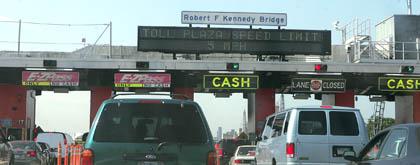By Philip Newman
Tolls on bridges and tunnels fell in the first half of 2009 in a reflection of job losses in the decline in New York City’s regional economy.
Both the Bridges and Tunnels division of the Metropolitan Transportation Authority and the Port Authority of New York & New Jersey reported a fall in the number of vehicles at tolling points in the first half of 2009.
The MTA reported tolls at the Brooklyn-Battery Tunnel fell by 7.1 percent between Jan. 1 and May 31, the largest decline among MTA-operated crossings.
The Queens-Midtown Tunnel fell 5.4 percent and tolls on the Robert F. Kennedy (formerly Triborough) Bridge’s Manhattan span declined by 5.1 percent.
Otherwise, it was the Henry Hudson Bridge down 3.8 percent, Throgs Neck Bridge down 3.6 percent, Gil Hodges-Cross Bay Veterans Memorial Bridge down 2.2 percent, Bronx-Whitestone Bridge down 1.2 percent and the Robert F. Kennedy Bronx span and the Verrazano-Narrows Bridge both down 1.7 percent.
The Marine Parkway Bridge gained 0.5 percent.
The Manhattan-connected crossings showed greater drops in traffic, perhaps reflecting the economic downturn, Bridge and Tunnels representatives said.
The decline was also felt on Port Authority bridges and tunnels.
The Port Authority Trans-Hudson subway numbers also declined by 3.5 percent in the first half of the year from 37 million riders during the first six months of 2008 to 35.7 million in the same period of 2009.
At the Port Authority’s six bi-state crossings, traffic dropped 3.1 percent, from 61.3 million vehicles to $9.4 million vehicles, with the Lincoln Tunnel hit the hardest with a 5 percent decline from 10.4 million vehicles to 9.9 million vehicles in the same period of 2009.
The Port Authority said truck traffic, which generates the most toll revenue, declined by double-digit levels. Truck traffic was down 11.2 percent from 4.2 million in the first six months of 2008 to 3.8 million in 2009.
The loss of truck traffic cost the Port Authority $3.6 million in the first half of the year.
“The Port Authority is not recession-proof,” said Port Authority Executive Director Chris Ward. “That is why we must continue to make tough spending decisions to ensure that our limited public resources are maximized for priority public projects.”
Reach contributing writer Philip Newman by e-mail at timesledgernews@cnglocal.com or phone at 718-229-0300, Ext. 136.



































